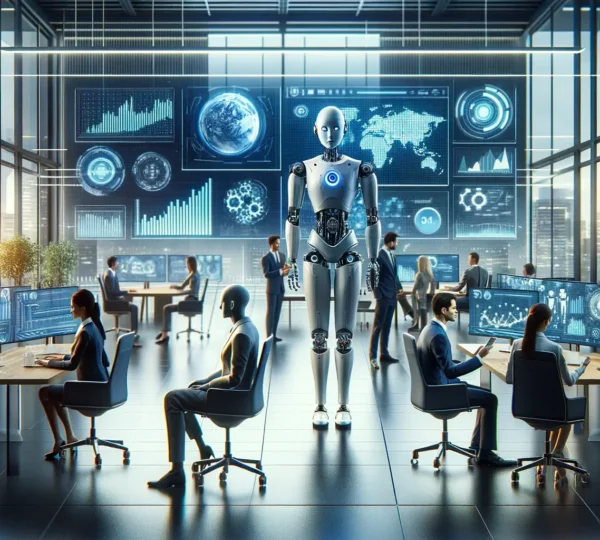Introduction
As we progress into a new era dominated by technology, Artificial Intelligence AI stands at the forefront of transformative change. It is not only reshaping industries but also influencing the way businesses and individuals interact with the world around them. With significant advancements in machine learning, deep learning, and data analytics, AI continues to grow in capabilities, offering innovative solutions across sectors. This year, several emerging trends in AI are set to further disrupt markets and drive new business models.
This article delves into the top 10 AI trends to watch, highlighting how they will impact industries, improve efficiencies, and open new avenues for growth.
AI Powered Automation in Business Operations
AI-driven automation is rapidly becoming a cornerstone of modern business strategy. By leveraging AI organizations can automate a wide range of tasks, from simple administrative functions to more complex decision-making processes. Automation tools are already being used in various sectors, including finance, healthcare, and retail, to enhance operational efficiency, minimize human error, and cut operational costs.
The rise of Robotic Process Automation RPA has enabled businesses to automate routine tasks such as data entry, invoice processing, and customer service inquiries. Additionally, AI systems that use machine learning are becoming increasingly adept at handling more complex workflows and processes that were once dependent on human input. For instance, AI powered chatbots are being used not only to engage customers but also to analyze customer sentiment and generate sales leads in real time.
Why it Matters:
- Optimizes operational workflows, reducing inefficiencies
- Increases scalability and enhances productivity
- Minimizes operational costs and human error
Personalization at Scale Using AI
AI ability to analyze vast amounts of consumer data and deliver personalized experiences is revolutionizing marketing strategies across industries. Personalization powered by AI is no longer limited to simple product recommendations on E commerce platforms. With advanced algorithms, AI can now tailor everything from website content to email marketing campaigns, improving engagement and customer satisfaction.
AI ability to predict customer preferences based on browsing history, social media interactions, and purchase behavior allows businesses to create hyper targeted marketing strategies. In the entertainment industry, streaming platforms like Netflix and Spotify use AI to recommend shows, movies, and songs tailored to individual tastes, boosting engagement and customer retention.
Why it Matters:
- Creates a highly individualized customer experience
- Increases conversion rates by offering relevant products and services
- Strengthens customer loyalty and improves retention
Generative AI for Content Creation
Generative AI represents a significant leap in the way content is created. Powered by advanced deep learning models, generative AI can produce everything from text and images to music and video. Platforms like OpenAI’s GPT 3 are already helping businesses automate content creation processes, drastically reducing the time and resources traditionally required for producing articles, reports, and even creative works such as ad copy and social media posts.
Generative AI is also being applied to the arts, where it can create original artworks, write poetry, and even generate video content. This technology has broad applications across industries such as digital marketing, entertainment, publishing, and education, where content creation is paramount.
Why it Matters:
- Reduces time and effort spent on content creation
- Facilitates scalability in producing high quality content
- Democratizes creative processes by providing AI tools to non experts
AI Powered Cybersecurity for Threat Detection
As cyber threats become more sophisticated, AI is becoming indispensable in protecting sensitive data and ensuring cybersecurity. AI driven solutions are capable of identifying and mitigating threats in real time by analyzing patterns of behavior and identifying anomalies that may indicate a security breach. Traditional cybersecurity systems often rely on predefined rules, but AI powered systems can adapt to new threats and respond proactively.
Machine learning algorithms are particularly effective in threat detection as they can continuously analyze network traffic, system behaviors, and even social engineering attacks. As data breaches and cyberattacks become more prevalent, AI role in cybersecurity will only continue to grow, offering realtime threat intelligence and more effective prevention measures.
Why it Matters:
- Provides realtime identification of emerging threats
- Reduces the risk of data breaches and cyberattacks
- Enhances the overall security infrastructure of businesses
AI in Healthcare Diagnostics
AI has made significant strides in the healthcare sector, particularly in diagnostics. Machine learning models trained on vast amounts of medical data can now detect early signs of diseases such as cancer, heart conditions, and neurological disorders with high accuracy. AI powered imaging tools can analyze X-rays, MRIs, and CT scans to spot abnormalities that may be missed by human radiologists.
In addition to improving diagnostic accuracy, AI is playing an essential role in the development of personalized medicine. AI can analyze patient data, including genetic information, to recommend individualized treatment plans, increasing the likelihood of successful outcomes.
Why it Matters:
- Enhances diagnostic accuracy and early detection
- Reduces healthcare costs by streamlining medical processes
- Improves patient outcomes through personalized treatment
Autonomous Vehicles and Transportation Innovation
The development of autonomous vehicles is one of the most promising and high profile applications of AI technology. AI powered self-driving cars are equipped with sensors, cameras, and machine learning algorithms that allow them to navigate roads and traffic autonomously, making decisions in realtime based on their environment. Companies like Tesla, Waymo, and Uber are leading the charge in developing and deploying autonomous vehicles for both personal and commercial use.
AI is also being integrated into logistics and transportation systems, improving route optimization, reducing fuel consumption, and enhancing delivery times. As these technologies mature, autonomous vehicles are expected to become a significant part of both urban and rural transportation networks.
Why it Matters:
- Enhances road safety by eliminating human error
- Reduces environmental impact through efficient driving
- Revolutionizes transportation and logistics industries
Advancements in Natural Language Processing
Natural Language Processing has made remarkable progress, particularly with the advent of large language models like GPT 3. These AI models are now capable of understanding, interpreting, and generating human like text with a high degree of fluency. NLP applications are found in customer support chatbots, content moderation, and language translation services.
As NLP continues to evolve, it will enable even more sophisticated AI human interactions, allowing machines to understand context, tone, and nuance in conversations. This will lead to more efficient communication and provide businesses with better tools to engage with their customers.
Why it Matters:
- Enables better AI human interactions
- Enhances customer service and support capabilities
- Improves cross linguistic communication through translation tools
AI in Financial Services for Fraud Detection and Risk Management
The financial services sector is one of the major beneficiaries of AI growing capabilities. AI is being utilized to improve fraud detection, automate transactions, and enhance risk management. Machine learning algorithms are able to detect unusual transaction patterns, identify potential fraud, and provide real-time alerts to banks and financial institutions.
AI is also improving risk management by providing more accurate predictions of market trends and investment outcomes, allowing financial institutions to make more informed decisions and minimize financial exposure.
Why it Matters:
- Enhances fraud detection and prevention measures
- Improves decision making in financial markets
- Optimizes operational processes in financial institutions
AI for Environmental Sustainability
AI is increasingly being harnessed to address global environmental challenges. From climate modeling to optimizing energy usage, AI is helping organizations better understand and mitigate the effects of climate change. AI technologies can predict weather patterns, monitor air and water quality, and help manage renewable energy resources more effectively.
Additionally, AI is being used in agriculture to optimize crop yields, reduce pesticide usage, and promote sustainable farming practices. As the world faces urgent environmental crises, AI offers solutions that can drive sustainability efforts and reduce human impact on the planet.
Why it Matters:
- Promotes sustainability and reduces environmental harm
- Optimizes resource usage in agriculture, energy, and industry
- Provides actionable insights for climate change mitigation
AI Enhanced Robotics and Industrial Automation
AI driven robotics is transforming industries by automating complex tasks that were once performed by humans. These robots, powered by AI, can perform precise tasks in manufacturing, healthcare, and logistics. AI enabled robotics can work in dangerous environments, perform repetitive tasks efficiently, and adapt to changing conditions.
Industrial robotics, for example, is improving production efficiency in factories, reducing costs, and enhancing product quality. In healthcare, robots are assisting in surgeries and patient care, while autonomous drones are optimizing supply chains and delivery systems.
Why it Matters:
- Increases efficiency and safety in high risk industries
- Enhances precision in manufacturing and healthcare applications
- Reduces operational costs and boosts productivity
What is AI powered automation, and how does it affect businesses?
AI automates repetitive tasks, boosting efficiency, reducing errors, and cutting costs in businesses.
How does AI personalize marketing strategies?
AI analyzes consumer data to deliver tailored experiences, improving engagement and conversions.
What role does generative AI play in content creation?
Generative AI automates content production, saving time and resources while creating high-quality materials.
How is AI improving cybersecurity?
AI detects and responds to threats in real time, enhancing security and reducing cyberattack risks.
How is AI transforming healthcare diagnostics?
AI improves diagnostic accuracy by analyzing medical images and enabling personalized treatments.
What is the role of AI in autonomous vehicles?
AI enables self driving cars to navigate and make decisions, enhancing road safety and efficiency.
How is NLP improving AI human interactions?
NLP allows AI to understand and converse naturally with humans, improving customer support and communication.
How does AI assist in fraud detection and risk management in finance?
AI detects fraudulent activities and assesses market risks, helping financial institutions make safer decisions.
How is AI helping environmental sustainability?
AI optimizes energy use, monitors environmental factors, and aids in climate change mitigation.
How does AI enhance robotics and industrial automation?
AI powered robots automate tasks, increasing efficiency and safety in industries like manufacturing and healthcare.
Conclusion:
As AI continues to evolve, its applications are expanding at an unprecedented pace. The trends outlined above illustrate the diverse and transformative ways AI is shaping industries across the globe. From enhancing business operations through automation to enabling groundbreaking innovations in healthcare and sustainability, AI is creating opportunities for businesses and individuals to thrive in the digital age.


